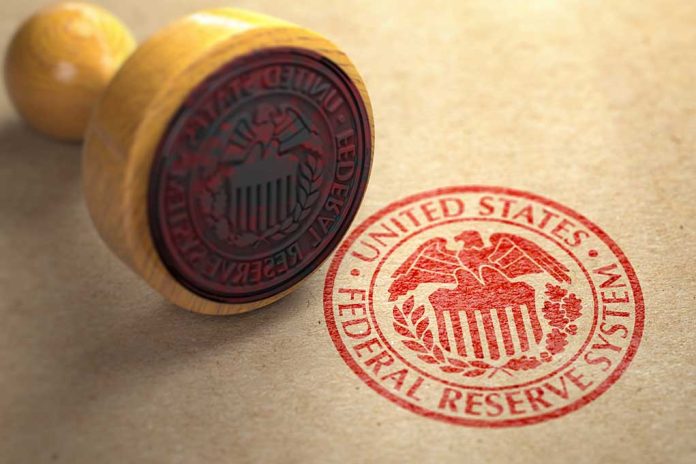
European nations are urgently scrambling to reclaim $245 billion in gold reserves from the United States as fears mount over President Trump’s unpredictable policies and potential interference with the Federal Reserve.
Key Takeaways
- Germany and Italy, ranking second and third globally in gold reserves, are under pressure to repatriate $245 billion in gold currently stored in U.S. vaults
- The Taxpayers Association of Europe has formally urged both nations to reconsider their reliance on the Federal Reserve for storing national gold reserves
- A survey of over 70 global central banks reveals a growing international trend of storing gold domestically due to fears of access restrictions during crises
- Germany has already taken steps toward gold sovereignty, having moved 674 tons from Paris and New York back to Frankfurt in 2013
- Geopolitical tensions, including U.S. actions toward Iran, have influenced gold markets, creating additional urgency for European nations to secure their assets
European Gold Rush Homeward
Germany and Italy are facing mounting pressure to withdraw billions in gold reserves from U.S. Federal Reserve vaults amid growing concerns about President Trump’s influence on American monetary policy. These European powerhouses, which rank second and third globally in gold holdings after the United States, currently store more than one-third of their reserves in New York. The combined value of these holdings exceeds $245 billion, representing a significant portion of both nations’ financial security that currently sits outside their sovereign control.
Former European Parliament member Fabio De Masi has emerged as a vocal advocate for relocating these precious assets back to European soil. De Masi argues that during these turbulent geopolitical times, national gold reserves should be physically stored within a nation’s borders or, at a minimum, within Europe. This position reflects growing sentiment among European officials that relying on U.S. institutions during periods of unpredictable American foreign policy presents unnecessary risks to national financial stability.
“The answer to this question is self-evident,” said Peter Gauweiler, German lawyer and politician, highlighting the growing sentiment that national gold reserves belong on national soil.
A Growing Global Trend
The push for gold repatriation is not isolated to Germany and Italy. A comprehensive survey of more than 70 central banks worldwide indicates a broader trend toward domestic gold storage. Financial institutions are increasingly concerned about potential access issues during international crises, leading many nations to reconsider their gold storage strategies. This shift represents a significant departure from post-World War II practices when many countries chose to store gold reserves in New York due to its status as a major trading hub and perceived stability.
Germany has already taken meaningful steps toward repatriation. In 2013, the nation moved 674 tons of gold from Paris and New York back to Frankfurt, signaling early concerns about keeping such valuable assets abroad. Meanwhile, in Italy, the nationalist “Brothers of Italy” party has made gold repatriation a key political issue, promising to bring national gold reserves home if they gain sufficient power. These moves reflect a growing consensus that national sovereignty must extend to control over precious metal reserves.
“Geographic location” is crucial when considering where to store national gold reserves, according to Fabio Rampelli, an Italian politician, emphasizing the strategic importance of physical control over national assets.
Trump’s Policies and Federal Reserve Independence
Central to European concerns is the potential for President Trump to exert undue influence over the Federal Reserve, the institution currently housing these massive gold reserves. While the Fed has publicly emphasized its policy independence and commitment to data-driven decision-making, European officials worry that political pressure from the White House could impact monetary policy in ways that might endanger foreign assets stored in American vaults. These concerns have intensified as Trump has previously criticized the Federal Reserve’s actions and leadership.
The Taxpayers Association of Europe has formally urged both Germany and Italy to reconsider their reliance on the Fed for gold storage, highlighting the risks of having national treasures under foreign control during periods of geopolitical uncertainty. This organization’s involvement signals that the issue extends beyond government officials to broader public interest groups concerned with national financial sovereignty. As global tensions rise, including recent U.S. airstrikes on Iranian facilities that sent ripples through financial markets, the pressure to secure these gold reserves grows more intense.
“We must not take any simplified paths,” cautioned Peter Gauweiler, German lawyer and politician, while still advocating for the repatriation of national gold reserves.
Market Implications and Economic Security
The debate over gold repatriation occurs against a backdrop of volatile financial markets. Recent geopolitical tensions have already caused gold prices to fall by 0.5%, while Bitcoin experienced a more dramatic drop of over 3%. These market reactions demonstrate how closely financial instruments are tied to international relations and policy decisions. For Germany and Italy, securing physical control over gold reserves represents not just a symbolic move toward greater sovereignty but a practical step toward ensuring economic security in uncertain times.
As the Federal Reserve maintains its current federal funds rate while anticipating possible cuts in 2025, European nations must weigh the benefits of continued storage in New York against the growing risks. The historical precedent that led to storing gold in American vaults now seems increasingly at odds with modern geopolitical realities. With $245 billion in precious metals at stake, the decisions made by German and Italian officials in the coming months could signal a fundamental shift in how nations view the security of their most valuable financial assets about American institutions.



